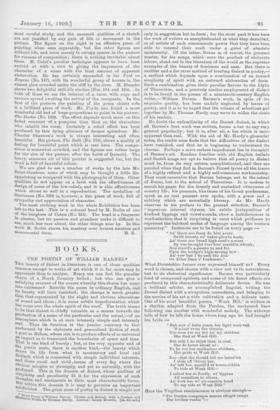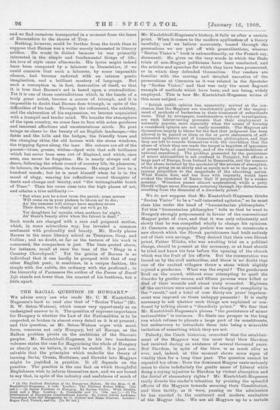BOOKS.
THE POETRY OF WILLIAM BARNES.*
Trtm beauty of dialect in literature is one of those qualities common enough in works of art which it is far more easy to aPpreciate than to analyse. Every one can feel the peculiar charm of a North Country ballad ; but who can give a satisfying account of the causes whereby this charm has Nine lute existence? Rewrite the poem in ordinary English, and its beauty will have vanished; the change is much greater than that represented by the slight and obvious alterations of sound and idiom ; it is some subtle transformation which has come over the whole spirit of the work! The truth seems to be that dialect is chiefly valuable as a means towards the Production of a sense of the particular and the actual,—of an atmosphere which is at once intensely simple and intensely real. Thus its function is the precise contrary to that Performed by the elaborate and generalised diction of such a Poet as Milton, whose aim is to produce effects of so universal au import as to transcend the boundaries of space and time. That is one kind of beauty ; but, at the very opposite end of the poetic scale, there is another kind,—the beauty which di:aws its life from what is momentary and local and distinct, which is concerned with simple individual interests, those small and vivid .issues of every day where the obvious mingles so strangely, and yet so naturally, with the P.rofound. This is the domain of dialect, whose qualities of 48;41Pheity and peculiarity fit it for the expression of such oughts and sentiments in their most characteristic forms, _114t.!t within this domain it is easy to perceive an important
bdivieion. The great mass of poetry in dialect is simple not
GIs_ geed Pooms of William Baraos. Chosen and Edited, wall a Preface and .searlia Notes, by Thomas Iludy. London ; Henry Frowde. Pa. Cat, not.]
only in suggestion but in form ; for the most part it has been the work of writers as unsophisticated as what they described, or of artists of such consummate power that they have been able to conceal their craft under a guise of absolute spontaneity. Of the latter, Burns is, of course, the greatest master, for his songs, which were the product of elaborate labour, stand out in the literature of the world as the supreme examples of the beauty of freshness and ease. But there is another and a far rarer method of treating dialect in poetry,— a method which depends upon a combination of an inward simplicity of spirit with an outward elaboration of form. Such a combination gives their peculiar flavour to the Idylls of Theocritus ; and a precisely similar employment of dialect is to be found in the poems of a nineteenth-century English writer,—William Barnes. Barnes's work, in spite of its exquisite quality, has been unduly neglected by lovers of poetry, and it is to be hoped that the volume of selections put together by Mr. Thomas Hardy may serve to widen the circle of his readers.
No doubt the unfamiliarity of the Dorset dialect, in which all Barnes's best work was written, forms a bar to any very general popularity ; but it is, after all, a bar which is more apparent than real. With the aid of Mr. Hardy's glossarial notes, the reader soon finds that the difficulties of the dialect have vanished, and that he is beginning to understand its charms. Perhaps a more serious impediment lies in the spirit of Barnes's art. Readers familiar with old English ballads and Scotch songs are apt to believe that all poetry in dialect must be, from its very nature, unsophisticated, and they are puzzled when they find in Barnes's Dorset lyrics all the traces of a highly refined and a highly self-conscious workmanship. They must remember that Barnes belongs, not to the school of Burns, but to the school of Theocritus. It is useless to search his pages for the homely and unstudied utterances of country life ; his peasants, like those of his Greek predecessor, speak as no real peasant ever spoke, with a grace and a subtlety which are essentially literary. As Mr. Hardy observes in his preface to the present selection, Barnes's " ingenious internal rhymes, his subtle juxtaposition of kindred lippings and vowel-sounds, show a fastidiousness in word-selection that is surprising in verse which professes to represent the habitual modes of language among the western peasantry." Instances are to be found on every page :—
"An' there noo foam do hiss avoro
Swift bwoats, wi' water-plowen keels,
An' there uoo broad high road's a-wore
By vur-brought trav'lors' ora.cklen wheels; Noo crowd's a-passen to and fro Upon the bridge's high-sprung bow : An' yew but I do seek the door
Ov Ellen Dare o' Lindenore."
What Dorsetshire farmer ever expressed himself so P Every word is chosen, and chosen with a view not to its naturalness, but to its rhetorical significance. Barnes was particularly fond of compound epithets, and some of his finest effects are produced by this characteristically deliberate device. He was a brilliant scholar, an accomplished linguist, writing the Dorset dialect with a scrupulous correctness, and bringing to the service of his art a wide cultivation and a delicate taste. One of his most beautiful poems, " Woak Hill," is written in a rhythm adapted from the Persian, the unrhymed linos following one another with wonderful melody. The widower tolls of how he left the house where long ago he had brought his bride
"But now o' loath years, her light voot-vall 'S a-lost vrom the vlooren.
Too soon vor my jay an' my childorn She died at Woak Hill.
But still I do think that, in soul, She do hover itbout ; To ho vor her motherless childern, Her pride at Weak Hill.
Zoo—lest she should tell me herea'ter I stole off 'ithout her,
An' left her, uncall'd at house-ridden To bide at Weak Hill— I called hor so fondly, wi' lippens All soundless to others,
An' took her wi' nar-reaclien hand To my side at Weak Hill."
Here the Virgilian reminiscence is obvious enough- " Ter frustra comprensa mantis effugit imago Par levibus ventis"—
and we find ourselves transported in a moment from the lanes of Dorsetshire to the shores of Troy.
Nothing, however, could be further from the truth than to suppose that Barnes was a writer merely interested in literary artifice. He wrote in dialect because be was primarily interested in the simple and fundamental things of life; his love of style came afterwards. His lyrics might indeed have been composed by a labourer in Dorsetshire, if we could conceive that such a labourer, by some impossible chance, had become endowed with an intense poetic imagination, and a brilliant mastery of language. But such a conception is, in fact, destructive of itself, so that it is true that Barnes's art is based upon a contradiction. Yet it is one of those contradictions which, in the hands of a truly great artist, become a source of triumph, and it is impossible to doubt that Barnes does triumph, in spite of the difficulties of his task. Through the refinement, the subtlety, and the elaboration of, his expresssion, we become acquainted with a tranquil and tender mind. We breathe the atmosphere of the open country, we come face to face with sober goodness and innocent affections and unostentatious mirth. No poet brings us closer to the beauty of an English landscape,—the fields and the hills and the hedges, the friendly trees and the changing skies, the old houses with the stone windows, the tripping figure along the lane. His colours are all of the purest—blues, greens, whites—dyed with that soft brilliance which has never been seen out of England, and which, once seen, can never be forgotten. He is nearly always out of doors, following the whole round of country life, its pleasures,' its labours, its absurdities, its dreams. He sings of love in a hundred moods ; but he is most himself when he is in the mood of elegy, weaving his reflections round thoughts of death and change and beauty, and "the unimaginable touch of Time." Then his verse rises into the high places of art, and attains a true sublimity :— " But when you be a-lost vrom the parish, zome mwore Will come on in your pleitzen to bloom an' tO die; An' the zummer will always have maidens avore Their doors, vor to chatty an' zee vo'k go by.
Vor daughters ha' mornen when mothers ha' night, An' there's beauty alive when the fairest is dead." .
Such words are charged with a rare and poignant motion, which, in some miraculous way, has invested a common sentiment With profundity and beauty. Mr. Hardy places Barnes in the same literary school as Tennyson, Gray, and Collins; and no doubt, so far as the texture of his work is concerned, the comparison is just. The lines quoted above, for instance, recall at once the tone of the "Elegy in a Country Churchyard." Yet the genius of Barnes is so individual that it can hardly be grouped with that of any other English poet; it combines, in a unique fashion, the simple with the subtle, the ordinary with the profound ; in the hierarchy of Parnassus, the author of the Poems of Rural life stands not lower than the nearest of his brethren, but a little apart.





































 Previous page
Previous page